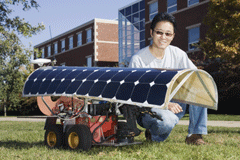Emerging Science Note/Weed-Killing Robots
Air Date: Week of October 20, 2006

University of Illinois graduate student Hong Young Jeon with the solar-powered robot. (Photo: University of Illinois.)
Jennifer Percy reports on the new robo-weed whacker. It’s a solar powered robot that kills weeds and could cut the use of herbicides.
Transcript
PERCY: Somewhere in the Illinois countryside, a killer is on the loose. They say he has 20-20 vision, uses GPS navigation and kills his victims with a single deadly blow.
But don’t worry, he’s just a weed killer. Agricultural engineers at the University of Illinois built a search-and-destroy robot designed to roam farm fields and hunt down problematic weeds. The robot is two feet tall, is powered by solar panels, and can travel up to three miles an hour. It’s equipped with a speedy computer, an 80-gigabyte hard drive, and even has a wireless Internet connection. The computer helps identify a plant’s features, letting the robot know what is and isn’t a weed. When it finds a weed, it snips it with his robotic arm and dabs a bit of herbicide on the cut stem.

University of Illinois graduate student Hong Young Jeon with the solar-powered robot.
(Photo: University of Illinois.)
That’s this week’s Note on Emerging Science, I’m Jennifer Percy.
Links
University of Illinois at Urbana-Champaign’s Department of Engineering
Living on Earth wants to hear from you!
Living on Earth
62 Calef Highway, Suite 212
Lee, NH 03861
Telephone: 617-287-4121
E-mail: comments@loe.org
Newsletter [Click here]
Donate to Living on Earth!
Living on Earth is an independent media program and relies entirely on contributions from listeners and institutions supporting public service. Please donate now to preserve an independent environmental voice.
NewsletterLiving on Earth offers a weekly delivery of the show's rundown to your mailbox. Sign up for our newsletter today!
 Sailors For The Sea: Be the change you want to sea.
Sailors For The Sea: Be the change you want to sea.
 The Grantham Foundation for the Protection of the Environment: Committed to protecting and improving the health of the global environment.
The Grantham Foundation for the Protection of the Environment: Committed to protecting and improving the health of the global environment.
 Contribute to Living on Earth and receive, as our gift to you, an archival print of one of Mark Seth Lender's extraordinary wildlife photographs. Follow the link to see Mark's current collection of photographs.
Contribute to Living on Earth and receive, as our gift to you, an archival print of one of Mark Seth Lender's extraordinary wildlife photographs. Follow the link to see Mark's current collection of photographs.
 Buy a signed copy of Mark Seth Lender's book Smeagull the Seagull & support Living on Earth
Buy a signed copy of Mark Seth Lender's book Smeagull the Seagull & support Living on Earth

